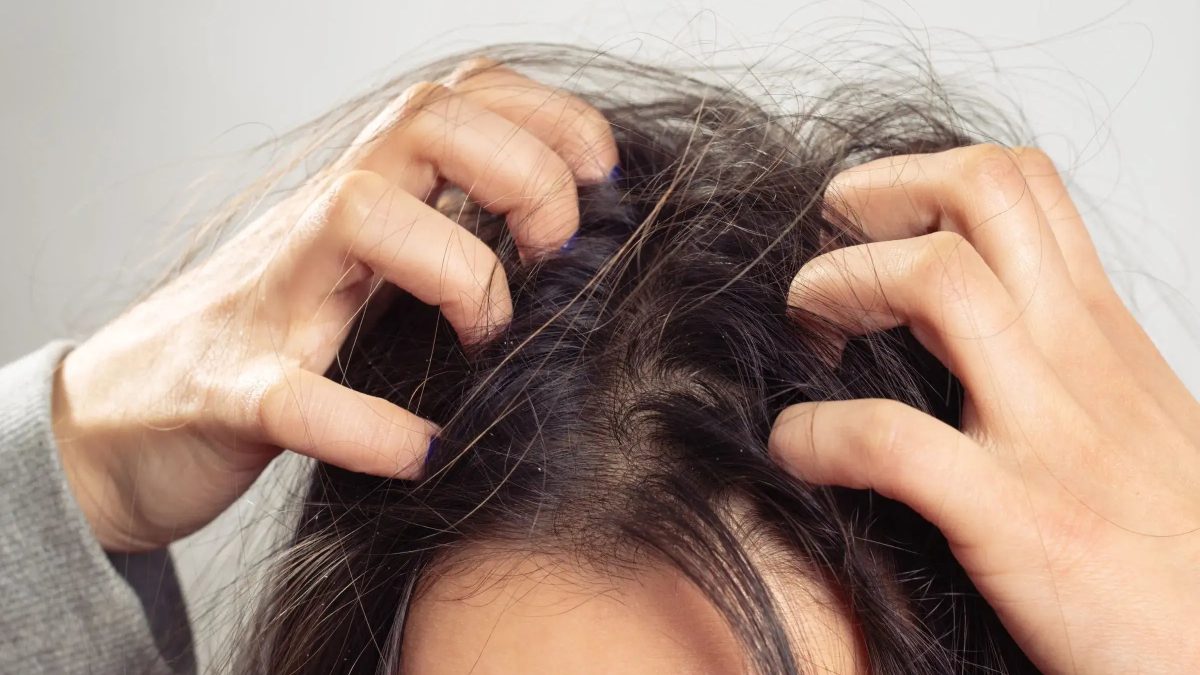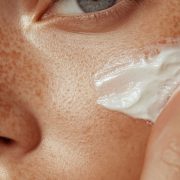Soothe & Nourish: The Best Natural Remedies to Calm an Itchy, Dry Scalp for Good
Posted on February 7, 2025 Written by: 100% PURE®

Does a persistent, itchy scalp have you scratching your head and pondering your sanity? Nothing tests the soundness of mind more than an itchy scalp that won’t quit. Whether it’s dryness, irritation, or dreaded flakes, the discomfort from an itchy scalp can be unbearable. While an itchy scalp is bothersome, to say the least, it’s important to figure out what your wayward scalp is trying to say.
An itchy scalp can result from dryness, product buildup, or scalp conditions like dandruff or eczema. But when you have “an itch you just have to scratch”, rather than opting for chemical-laden treatments, natural remedies can provide long-lasting relief and restore scalp health.
Read on to discover the causes of scalp distress and how you can de-stress from a crazy, itchy scalp. We’ll cover five effective natural remedies that can help you say goodbye to an itchy, dry scalp—plus the best conditioner to lock in moisture and keep irritation at bay – and the scalp sanity struggle!
What Causes an Itchy Scalp?
Our innocent, sensitive scalps are often left susceptible to evil product stress, harsh, impure conventional ingredients, and deprivation of moisture and nourishment. This negligence leads to various issues, including dryness, itchiness, an excess of oil at the follicle, irritation, or the dreaded flakes.
When these issues arise on the scalp, it’s important to pay attention to the symptoms and what causes them. Your scalp might be trying to tell you exactly what’s happening, but you’re understandably preoccupied with the hair-rible itching!
Without further ado, here are common culprits behind an itchy scalp, a.k.a. scalp pruritus, and why natural treatments will have your scalp hair-py and healthy in no time.
Common Culprits Behind Scalp Itchiness:
Dry scalp from lack of moisture
A dry scalp occurs when the scalp lacks moisture, which can lead to itching, flaking, and sometimes, small white flakes. It can also cause the hair to look dull and lifeless. A dry scalp can be caused by several factors, including weather changes, excessive heat styling, the use of harsh hair products, and not washing the hair regularly.
Product buildup from silicones and sulfates
Hair products might promise the world in terms of shine, volume, and strength, but some ingredient lists reveal a murkier picture.
Sulfates are a type of detergent and surfactant that effectively removes dirt and oil from hair. However, they are too effective at their job, stripping the scalp and hair of their natural oils. This can lead to scalp irritations and product buildup. Silicones are another culprit that gives products a silky texture and makes hair feel smooth and shiny, but they can build up on the hair, weighing it down and making it look greasy. They can also prevent moisture from penetrating the hair shaft, leading to dryness.
Product buildup from silicones and sulfates in conventional hair products causes a residue that can weigh down hair, make it appear dull, and contribute to scalp irritation; while silicones create a coating on hair strands that can trap dirt and oil, sulfates can strip away natural oils, sometimes causing the scalp to overcompensate by producing more oil, further adding to the buildup issue.
Sensitivity to hair products or harsh chemicals
Most haircare brands are notorious for using too many strong chemicals. There is a reason why the does more harm than good. An irritated scalp reaction from harsh chemicals in hair care products can cause burning, itching, dryness, redness, or flaking. This is typically triggered by sulfates, fragrances, or dyes that can strip the scalp’s natural oils and disrupt its protective barrier.
Sulfates: If you start getting an allergic reaction from a hair or scalp product, there’s a high chance that sulfate is the culprit behind it. It creates foam in products but is absent in natural shampoos and conditioners.
Parabens: Parabens are used as preservatives to increase the shelf life of products, but they can cause scalp irritation, dryness, and redness.
Fragrance: The word fragrance is just a decoy that many brands use to avoid writing the actual chemicals they use to add the scent. Fragrances can irritate sensitive scalps.
Synthetic Dye: Just like fragrance, the colors added to hair dyes are also curated from chemicals. Petroleum and coal tar are often the origins of these colors, and they are damaging to hair and overall scalp health.
Fungal infections or dandruff: Dandruff is a common condition that affects the scalp, causing flaky, itchy skin. The flakes are often white or yellowish and can be seen on the hair, clothing, or shoulders. Dandruff can be caused by a variety of factors, including dry skin, a buildup of oil and dead skin cells, or fungal infection. When you have dandruff, the cause is too much oil on the scalp. That excess oil causes skin cells to build up and shed pesky, party-crashing flakes onto your shoulders.
Environmental factors like cold weather or pollution: Environmental factors, like cooler weather or pollution, can lead to scalp irritation. These factors can cause dryness, irritation, dandruff, and itchiness and even contribute to hair loss due to the damaging effects of these elements on the hair follicles and the scalp’s natural barrier function. Cold weather tends to draw moisture from the scalp, leading to dryness and flakiness, while pollution can leave behind residue that clogs pores and irritates the skin on the scalp.
Why Treating Itchy Scalps Naturally Works Best
A happy scalp is to healthy growth as natural hair products are the keys to luscious locks. Natural hair products for an itchy scalp or a dry scalp work best because they can soothe irritation, remove buildup, and restore moisture all without the use of harsh chemicals that can wreak havoc on your locks and scalp. From natural ingredients to long-term scalp health, treating an itchy scalp naturally has many benefits that can unlock your hair’s true potential!
Avoids harsh ingredients that strip moisture
One of the main reasons for dry and itchy scalps is the irritants present in hair care products. The high percentage of drying alcohol and other harsh chemicals in these formulas can strip the scalp of its natural oil and moisture. Natural hair products don’t contain harsh ingredients that strip moisture to prevent buildup and damage to hair. They are made from ingredients that are derived from natural sources such as plants, herbs, and essential oils, along with hair-loving vitamins to nourish, repair, and strengthen strands.
Supports long-term scalp health
The chemicals in traditional products can alter your hair’s natural pH balance, which can cause long-term damage to your hair and scalp. Another advantage of naturally treating an itchy or dry scalp is that nature-derived formulas don’t cause any long-term damage. These gentle formulas maintain the pH balance of your hair and scalp, keeping it healthy and hydrated in the long term.
Uses gentle, nourishing ingredients
Traditional hair care products often prioritize one hair type over others, resulting in damaged and unmanageable hair. Natural hair products don’t contain harmful irritants, promoting healthy and defined hair, and they cater to every hair type and texture. With a focus on natural and organic ingredients, they are gentle on your scalp and hair. This leads to less breakage, less hair fall, and a more defined hair texture.
5 Natural Remedies to Soothe an Itchy Scalp
We know that hair can’t thrive on a scalp that isn’t healthy, especially if it’s an itchy or dry scalp. Using essential oils and natural ingredients for hydrating, soothing, and conditioning the scalp can help nourish our scalp and strands while they’re in repair mode from the itchy, scratchy phase.
Some essential oils are even good for hair growth and can increase blood flow to the scalp, enhancing the health of the hair and growth rate for faster and improved results. Let’s uncover some natural treatments that can soothe an itchy scalp.
#1. Aloe Vera Scalp Treatment
Why it works: Aloe vera hydrates, reduces inflammation, and decreases irritation instantly. This super-hydrating natural hair ingredient helps to soothe inflamed scalp conditions while conditioning and hydrating the hair. This helps to clear clogged scalp pores for improved shine and growth over time.
How to use: Apply fresh aloe gel to your scalp, leave for 15 minutes, and then rinse.
Natural products with aloe:
This dynamic duo, featuring aloe vera, is perfect for cleansing and nourishing the scalp while soothing irritation. It uses the power of burdock root and neem to balance your scalp’s natural oils, alleviating dryness and excess buildup. Unlike many shampoos that can strip the scalp of its natural moisture, this one helps keep things in hydration harmony without over-drying, while the conditioner works to nourish the scalp, promoting a calmer, more comfortable environment for your hair to grow.
#2. Apple Cider Vinegar Rinse
Why it works: Apple cider vinegar (ACV) balances pH levels, removes buildup, and combats scalp irritation. It can soothe an itchy scalp because it has anti-inflammatory properties, helping with scalp irritations, dry scalps, and dandruff. ACV’s natural acidity rebalances the scalp’s pH levels, which can also help prevent dandruff and excessive itchiness. It can also remove product buildup, mineral deposits, and grease from the scalp and hair and restore the hair’s natural vibrancy and luster.
How to use: Mix one part apple cider vinegar with two parts water, apply to the scalp after shampooing, and rinse after 5 minutes.
#3. Coconut Oil & Tea Tree Treatment
Why it works: Known for its soothing properties, tea tree oil helps combat an itchy scalp and issues like dandruff, acne, and bacterial and fungal infections. Coconut oil is lightweight, deeply moisturizing, and similar to the hair’s natural oils, it can sink in and hydrate in a way that few other oils can. When these two super scalp ingredients combine, love is in the hair!
How to use: Mix a few drops of tea tree oil with coconut oil, massage into the scalp, leave for 30 minutes, and then wash out.
Natural products with coconut oil:
Nourish and rejuvenate your scalp with our deeply moisturizing honey and coconut combo. Our intensely hydrating formulas include gentle cleansing coconut oil to hydrate and hydrate some more. Yes, that’s been overstated because hydration is essential for a rich and creamy lather that won’t strip or stress your scalp. In this formula, we use saponified coconut oil, which is a fancy term that means . It acts and feels like a sulfate with the nutrition and results of softening and smoothing coconut oil.
#4. Oatmeal & Yogurt Scalp Mask
Why it works:
Oatmeal’s anti-inflammatory properties can soothe an itchy scalp, while yogurt contains probiotics and lactic acid, which can help exfoliate and balance the scalp. The delicious combination of oatmeal and yogurt can be beneficial for the scalp, as both ingredients have properties that can soothe irritation, moisturize dry scalp, and potentially help manage dandruff due to their anti-inflammatory and cleansing effects.
How to use: Blend oats with yogurt, apply to the scalp for 20 minutes, and then rinse.
#5. Rosemary & Peppermint Oil Scalp Massage
Why it works:
has gone viral as one of the essential oils for hair growth lately. It helps stimulate oxygen and blood flow for hair growth and a conditioned scalp. also stimulates blood flow, with the added benefits of relieving itching and supporting hair growth. When these two ingredients combine via treatment or serum, for example, it can help to stimulate improved or increased hair growth, shine, and volume.
How to use: Mix rosemary and peppermint oil with carrier oil and massage into the scalp for 5-10 minutes before washing.
Natural product with rosemary:
It’s no secret that different hair types require different hair treatments, but all scalps benefit from some stimulation. Our favorite ingredient for promoting hair growth is organic rosemary oil. This essential oil is rich in antioxidants and anti-inflammatory properties that can refresh and balance the scalp, and
helps stimulate hair growth by improving blood circulation in the scalp, promoting nutrient delivery to hair follicles, and strengthening hair strands.

Choosing the Best Conditioner for an Itchy, Dry Scalp
We all know about conditioning our ends, but what about our scalps? Once considered taboo, stylists would advise us to only apply conditioner from our ears to our ends. This method will leave you with softened, relaxed ends but sad, frizzy roots. Remember this: A healthy scalp means healthy hair. The more TLC you give to your scalp, the healthier your scalp will be to grow hair. This means spreading the same love that you apply to your ends, to your roots.
Why Conditioner Matters:
Hydration is key to preventing scalp dryness and irritation. Every time you shampoo or clarify your hair, you’re stripping your scalp’s natural oils. Stripping the scalp of its natural oils without replacing that lost moisture will lead to an itchy scalp, dryness, and dandruff over time. While we don’t want a buildup of sebum (oil) that can damage the follicle or impede healthy hair growth, we do need our scalp to be moisturized to function at its best – and that’s why conditioner matters.
What to Look for in A Natural Conditioner:
Natural conditioners are a game changer! Unlike the chemical-laden ones, they’re packed with like coconut oil, aloe vera, argan oil, and shea butter. These ingredients help restore moisture, eradicate scalp itch, repair damage, and improve the overall health of your scalp and strands. They also tackle the root causes of dry scalp, not just cover it up, but deliver scalp-quenching moisture.
#1. Sulfate-Free & Silicone-Free Formulas
When choosing the best conditioner for an itchy, dry scalp, look for sulfate- and silicone-free formulas. Product buildup from silicones and sulfates in conventional hair products causes a residue that can weigh down hair, make it appear dull, and contribute to scalp irritation; while silicones create a coating on hair strands that can trap dirt and oil, sulfates can strip away natural oils, sometimes causing the scalp to overcompensate by producing more oil, further adding to the buildup issue.
#2. Hydrating Ingredients
Some of the top hydrating ingredients in the best conditioner for an itchy, dry scalp are aloe, coconut oil, argan oil, and shea butter. Aloe vera is known for its ability to deeply hydrate and soothe the scalp; coconut oil is lightweight, deeply moisturizing, and similar to the hair’s natural oils that it can sink in and hydrate the scalp in a way that few other oils can; shea butter provides intense nourishment without buildup on the scalp; argan oil is nourishing and rich in essential fatty acids and antioxidants, helping to soothe an itchy scalp and repair dry strands.
#3. Scalp-Soothing Botanicals
Ingredients like neem, rosemary, and peppermint are not only some of the best scalp-soothing botanicals, but they also promote growth by strengthening the follicles and improving scalp health.
Best Choice:
This conditioner is packed with vitamins and minerals to intensely hydrate and seal in moisture, ensuring that your scalp and hair remain nourished and protected throughout the day. The multivitamin formula features biotin, vitamin C, and vitamin E for soothing irritation, reducing flakes, and restoring scalp health.
FAQs About Itchy Scalp & Dry Scalp Remedies
How often should I wash my hair if I have an itchy scalp?
It depends on your hair type and lifestyle. For most people, washing 2-3 times a week with a nourishing shampoo like the is ideal. Overwashing can strip your scalp of natural oils, while infrequent washing can lead to buildup and an itchy scalp. Don’t forget to use it in tandem with the .
Can an itchy scalp lead to hair loss?
Absolutely. A healthy scalp is essential for strong hair growth. An itchy scalp or one with buildup can block hair follicles, slowing hair growth and increasing shedding. Regular scalp care, including hydration, exfoliation, and the use of plant-based products, can help create a healthy environment for hair to thrive.
3. Can I use conditioner on my scalp?
Yes! Conditioning your scalp can help restore moisture and prevent dryness. Use a lightweight, natural conditioner like to keep your scalp hydrated without weighing down your hair.
How long does it take for natural remedies to work?
The timeframe for results from natural hair remedies varies by hair type and texture. Depending on scalp issues, like irritation or buildup, formulas for your hair concerns may take 2-3 weeks to put hair and the scalp back into balance. This could also be true for color-treated hair.
Are there any scalp care practices I should avoid?
Avoid using traditional hair products and treatments that often contain hair-harming chemicals and harsh, drying ingredients for the scalp. Refrain from excessive heat styling, as it can damage the scalp, and over-washing your hair and scalp, which can strip them of natural oils, leading to dryness or irritation. Additionally, be cautious with scalp treatments that contain strong chemicals or irritants.
Final Thoughts: Soothe Your Scalp Naturally
Nothing tests the soundness of mind more than an itchy scalp that won’t quit. Whether it’s dryness, irritation, or dandruff, the discomfort from an itchy scalp can be frustrating. While an itchy scalp is bothersome, to say the least, it’s important to figure out what your wayward scalp is trying to say. And that’s where the power of Mother Nature comes in!
Natural remedies provide lasting relief without scalp-harming chemicals. Natural ingredients can provide a range of benefits for the scalp, such as hydration, protection from environmental stressors, and anti-inflammatory properties. These ingredients are also often gentler on the scalp than chemically laden, traditional products, making them the best choice for those with an itchy or dry scalp.
The benefits of using natural hair care products for an itchy scalp cannot be overstated. From promoting a healthy scalp and strands to preserving long-term scalp health, natural beauty has it all. So, make the switch today and see the difference for yourself. Start incorporating one or more of these remedies into your haircare routine today. Browse and take the first step toward a healthier, itch-free scalp!
It’s time to say goodbye to harmful chemicals and hello to a healthy, happy scalp and beautiful hair. That’s a hair-ray – and an end to the scalp (and mind) sanity struggles.




